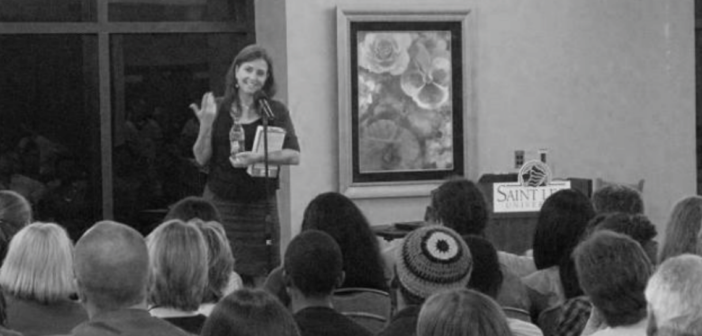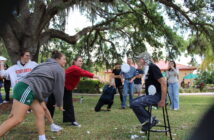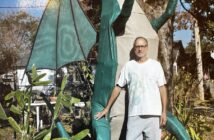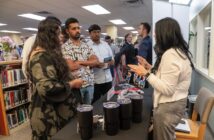By Jessica Pall, Online Editor
“The HeLa cell has affected every person in this room either through a developed vaccine or antibiotic, yet virtually no one knows the origin of this cell and whether its donor gave their consent or not,” said Rebecca Skloot, award winning author.
Skloot came to Saint Leo University on Tuesday, September 28 to discuss and read excerpts from her new book. The Immortal Life of Henrietta Lacks is a rich, resonant tale of modern science [because of]the wonders it can perform and how easily it can exploit society’s most vulnerable people,” said Publishers Weekly.
Many researchers have used HeLa Cells in their laboratory and in research for their graduate thesis, but most don’t know that these cells came from Henrietta Lacks, a black woman living during 1920-1951 in Virginia.
The Immortal Life of Henrietta Lacks, which was available for sale February 2, 2010, has become widely read because it confronts questions concerning bioethics, such as who can profit off of human biological material and what does this mean for the advancement of science?
“I felt it was my role as a journalist to put the story out there for the public to learn, and I feel that it helped the Lacks family let go of their anger and hurt,” said Skloot.
Bioethics, essentially the ethics practiced in medicine, has become a relevant issue today for many people as science continues to take strides forward in advancement.
“As a scientist, the talk made me think about where the cells you are using originate, because in lab you use random cells and you don’t stop to think about where they come from. Overall, I think Henrietta’s story is one everyone should know about because it promotes aware-ness about bioethics,” said senior biology major Daniel Salahuddin.
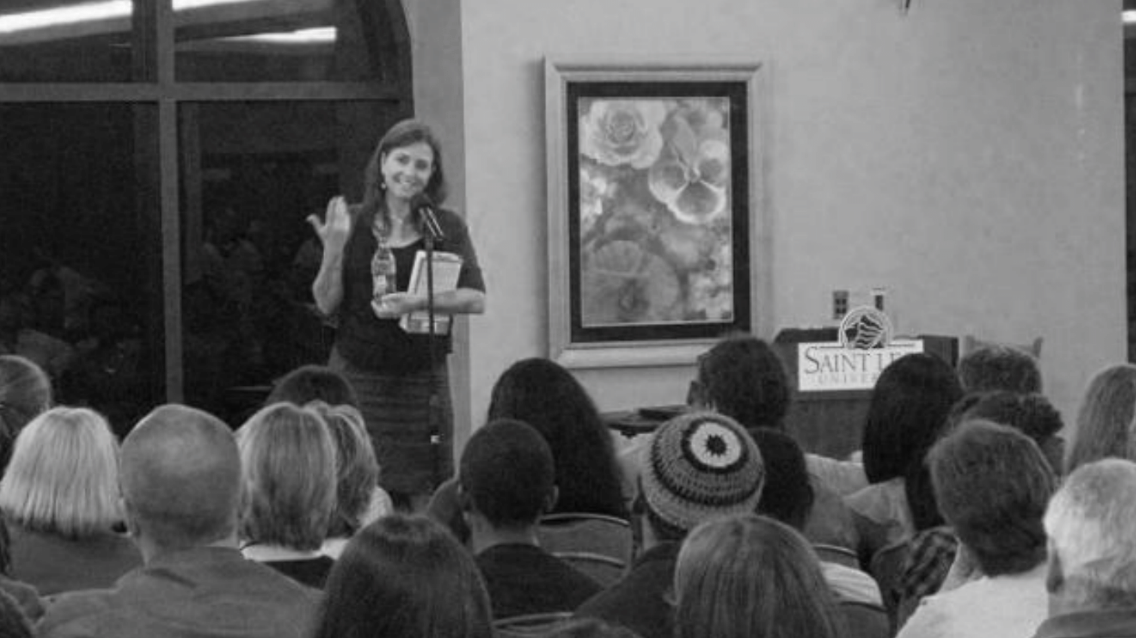
The truth about Henrietta Lacks’s story is that a doctor from John Hopkins Hospital cut a sample of a cancerous tumor on her womb to be researched without her knowledge.
Because of their hardiness, her cells do not die easily and are easy to conduct research on. No one knows why they are so durable, but we do know the cells have been used all over the world for research and were essential in helping create the polio vaccine and for major advances in in-vitro fertilization, cloning, and gene mapping.
Because Lacks lived during a time when segregation was prominent and the black community had a long history of misuse for research, Skloot said it is one of the deepest ironies in science that a black woman’s cells were used, and black doctors found a cure for polio for the whole world.
Since that first tumor sample, Lacks’ original cells have multiplied to an almost inconceivable number. If one could pile all HeLa cells ever grown onto a scale, they would weigh more than 50 million metric tons — as much as a hundred Empire State Buildings.
The cells were at first freely given away for research because doctors were excited that an “immortal cell line” was finally created, but later a factory which mass produced the cells was opened, turning the first commercialized cell into a multimillion-dollar industry.
Meanwhile, her family had no idea this was occurring. Although the family today has not received any financial benefit from Lacks’ cells, Skloot has setup a foundation, the Henrietta Lacks Foundation, this past January, which has received enough money to send five of Lack’s grandchildren to college and provide some support for health insurance. However, the Lacks family is still very poor and is mostly unable to afford health insurance. Her children wonder why they cannot afford to see a doctor if their mother was so important for medicine.
The conflict whether to give the family money or not is difficult because many other people have had samples of their cells taken without consent or research done on them without their knowledge and have also not been compensated. By giving them money now, would the future of science become inhibited with cost? Currently, the problem is still unresolved for what compensation the Lacks family should receive, if any.
Essentially, the book traces Henrietta’s life and follows Deborah’s acceptance of what happened to her mother and how it has impacted the world. Skloot said that the research she conducted and the relationships she formed with the Lacks family while writing this book opened her horizons immensely as she dealt with issues of class, race, religion and what it means to have access to education.
Skoot is an award-winning science writer whose articles have appeared in the New York Times Magazine, The Oprah Magazine, Discoverer, Columbia Journalism Review and others. Among other accomplishments, Skloot has an undergraduate degree in biomedical science from Colorado State University and an MFA in Nonfiction writing from the University of Pittsburgh.
“I advise you to always be curious,” said Skloot as she addressed the students of the audience.
As Skloot first became curious about Henrietta Lacks in her eleventh-grade high school chemistry class. “You never know what class you will be in that will make you stop and question what you learned; thus, always follow your moments of curiosity,”she told students.
Overall, the Lacks family is happy their story is being told, Skloot said. They live faith filled lives and have come to believe that the cells are a miracle, which have helped many people and still continue to do so.
More information about Rebecca Skloot, The Immortal Life of Henrietta Lacks, and the Lacks family can be found online at Skloot’s website http://rebeccaskloot.com.

